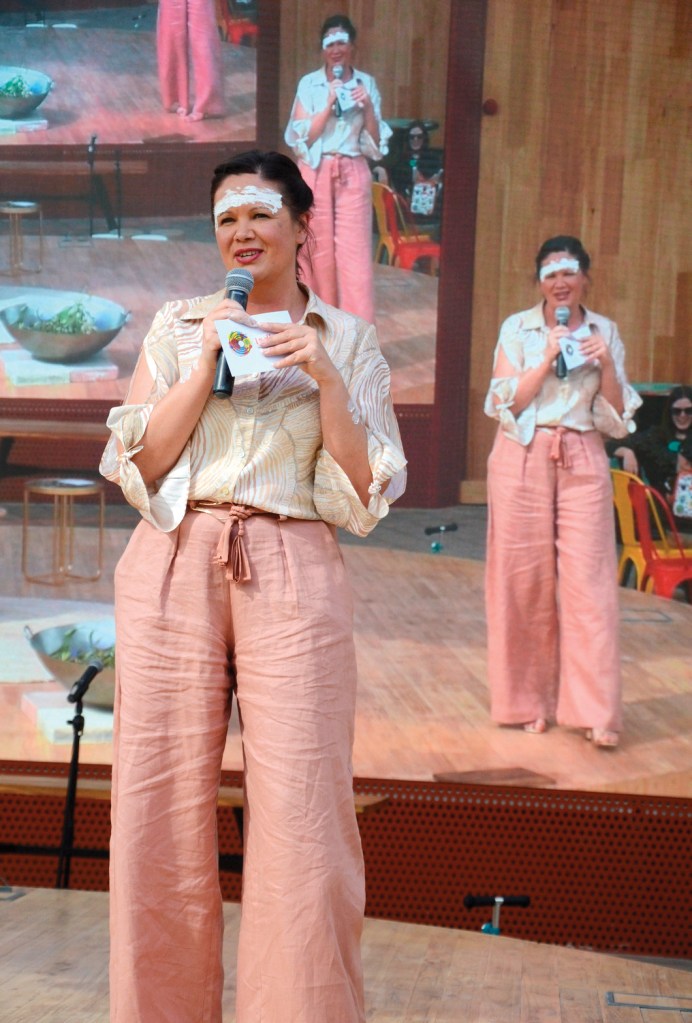As the founder of Australia’s first Indigenous edu-tech company, CEO Mikaela Jade has created a place where Indigenous cultures and critical technologies meet.

As a 21-year-old park ranger in 2005, Jade became involved in a conservation project involving dugongs and turtles in the Great Barrier Reef.
The elders of five Indigenous groups created a self-imposed ban on dugong hunting and a self-managed permit system for marine turtle hunting.
It was the first multi-clan agreement formed, and its execution in partnership with the Queensland Government required sensitivity and mutual respect.
“It was complex and challenging work for a 21-year-old, but the (Indigenous) women kept asking me to be involved,” says Jade. “I would sit around their kitchen tables and say, ‘Okay, let’s talk about this moratorium’. But they just kept asking me who my mob were.”
After double-checking with her mother, Jade told them she wasn’t Indigenous.
An agonising search
When she later took on a new role in Exmouth in Western Australia’s North West Cape, Jade kept fielding the same questions about her identity. Her suspicions grew, but her mother remained tight-lipped.
“I spent five years searching for the truth, but I had nothing to go off,” she says.
Jade was at home one night in her “crappy rental” in Canberra when her sister phoned her up, desperate to help her.
“I told my sister that I couldn’t rebuild my life without knowing my past.”
More from Forbes Australia
Against their mother’s wishes, her sister begged their grandfather, then in frail health, to open up. At 29, Jade discovered that she was a Cabrogal woman from the Georges River area, from the Dharug-speaking nation of Sydney.
Her ancestors had fought in the First and Second World Wars and were returned servicemen without pay. They were also dispossessed of their lands.
“Our family was pushed around the Sydney basin, and by the time my mother was born, the family was so dispersed that it did not identify as Indigenous,” says Jade. “My grandfather’s family members had endured trauma and atrocities, and so I think he simply wanted to leave that part of his life behind.”
Jade was relieved. It explained why she had been drawn to working with Indigenous communities since age 18.
“I promised myself that I wouldn’t get angry about what had happened to our family and that I would put my energy into doing something positive for future generations,” she says.
From park ranger to tech entrepreneur
In 2012, Jade saw augmented reality for the first time at the University of Canberra and was struck by the idea of using it in national parks to tell local stories better. She spent two years learning augmented-reality production from a UK expert. She remained a park ranger by day and studied over Skype by night.
In 2014, Jade founded Australia’s first female Indigenous-owned and managed edu-tech company. Indigital aims to improve understanding of First Nations culture and to build future employment opportunities in emerging technologies among Indigenous communities.
Indigital’s partners include Microsoft and it provides consulting services to Australian technology companies, banks and mining companies.
The Indigital Schools program has worked with more than 9000 students and nearly 500 educators. It teaches skills in coding, 3D software, augmented and virtual realities, and machine learning. Her fast-growing team regularly meets in holographic form, and Jade has a digital twin.
“We try to make sure that our people can see themselves in the opportunities and industries of the future,” says Jade.
“I would love to see more indigenous entrepreneurs and businesspeople. It’s a great way to break the intergenerational reliance on philanthropy and financial support.”
However, she adds that many obstacles line the path to entrepreneurship, including ingrained stereotypes and biases.
Nonetheless, Jade foresees that having more Indigenous-led tech companies will boost innovation across the sector.
“Our cultural knowledge systems can help to progress Australia’s own innovation landscape,” she says.
“Many ways we think are very different to Western cultures. The collision of these ideas is such an exciting place to be.”
Jade reels off examples of indigenous science, such as how to feel electromagnetic fields for navigation and using the night sky to determine whether there is water up ahead.
“A lot of cultures look at the shiny bits in the sky,” she explains.
“Our cultures tend to see patterns not only by looking at the stars but also at the space between them.”
A global perspective
Mikaela Jade is a World Economic Forum Global Futures Council member and a delegate of the UN Permanent Forum on Indigenous Issues. In 2019, Jade addressed the UN on World Indigenous Peoples Day. “I wanted to convey that Indigenous people can lead in the technology sector.”
In 2022 she addressed the UN in Geneva. “My message was around challenging the rest of the world to help First Nations people fully participate in metaverse development, and to bust stereotypes that people have about our way of knowing, being and doing.”
Indigital runs programs with Maori communities in New Zealand and Indigenous communities in Canada.




